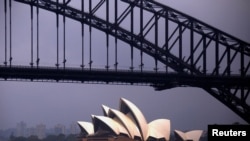The lawyer for a Sydney-based professor who was prevented from leaving China said Sunday that his client has been allowed to return to Australia, apparently bringing closure to an incident that raised concerns about the safety of conducting academic research in China.
The barring of associate professor Feng Chongyi from leaving the country had prompted diplomatic appeals from Australia and an open letter to China's leaders from dozens of academics.
Feng's lawyer Chen Jinxue said Feng flew home from the southern city of Guangzhou on Saturday night after a final round of questioning by security agents from the southwestern province of Yunnan, where Feng had traveled to during his most recent visit.
"By request of the state security department, I am unable to discuss the contents of the discussions," Chen told The Associated Press by telephone. Chen said that while Feng was not able to leave China, he had never been in formal detention.
Feng told reporters in Australia on Sunday that he wasn't sure why he was allowed to leave China, but suspected international pressure may have played a role. He said he was unable to discuss the details of his experience.
Australia's Department of Foreign Affairs and Trade said in a statement that the government welcomed the news of Feng's return.
Australian Foreign Minister Julie Bishop said last week that her government had been making representations on Feng's behalf despite the long-term Australian resident not having Australian citizenship.
The reasons Feng had been barred from leaving were never clear. Chinese Foreign Ministry spokesman Lu Kang said Thursday that Chinese law enforcement authorities acted "while performing duties of safeguarding national security."
Feng had been wrapping up a three-week trip researching human rights lawyers. Since July 2015, Chinese authorities have questioned or detained hundreds of activists and independent legal professionals as part of a crackdown on civil society under President Xi Jinping. Some of the lawyers have been labeled threats to national security.
Rights groups and Western governments including the U.S. have urged China to release the activists and lawyers detained in the crackdown, while critics say the campaign is aimed at silencing opponents of the ruling party.
Chen said last week that Feng's troubles may have been related to his research on the lawyers, and that state security officials who met with Feng at his hotel in Guangzhou asked him who he met with in China and in Australia during the course of his research.
The incident unfolded as Chinese Premier Li Keqiang finished up a five-day trip to Australia, during which the two countries sought to boost trade ties.
The open letter on Feng's case, signed by more than 80 scholars, stated that the signatories were "disturbed that a fellow researcher, who has dedicated himself to promote the understanding of and interest in China, has been prevented from returning to his home and workplace for no reason other than his conscientious work as a China Studies scholar.
"Such actions make it difficult for the rest of us to be confident in the research environment in China today, and do not contribute positively to the continued construction of open and productive higher education collaboration between China and the rest of the world."
Professor Detained in China Returns to Australia

BEIJING —



